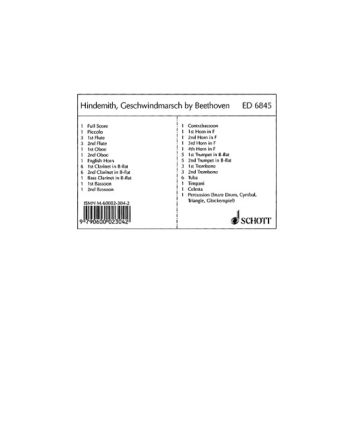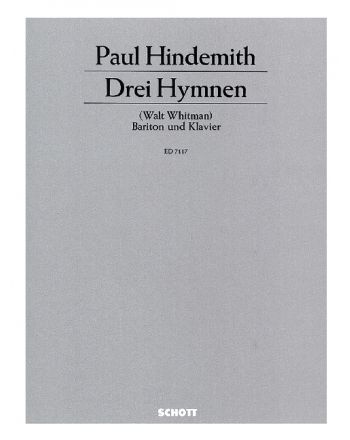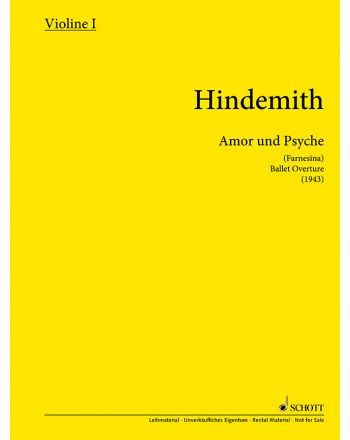
Paul Hindemith
À venir
À propos de Paul Hindemith
In general, the lack of contact in music between the producer and the consumer in our time is regrettable; a composer should only write when he knows for what purpose he is composing. The days of simply composing for oneself have perhaps now been lost for ever. (Paul Hindemith)
Paul Hindemith was born on 16.11.1895 in Hanau. He studied the violin and composition with Adolf Rebner, Arnold Mendelssohn and Bernhard Sekles at the Hoch Conservatory in Frankfurt/Main. He was only twenty when he was appointed as the leader of the Frankfurt Opera Orchestra. After the end of the First World War, he returned to Frankfurt and founded the Amar Quartet in which he played the viola from 1922 to 1929. In 1923, Hindemith became a member of the organisational committee for the Donaueschingen Music Festival: it was at this festival that he gained an initial reputation following the first performance of his String Quartet Op. 16. In 1927, he was appointed as professor for composition at the Hochschule für Musik in Berlin. His career as a composer reached a first peak at the beginning of the 1930s, but with the seizure of power by the National Socialists, his works were declared as “culturally bolshevist” and disappeared from concert programmes. Hindemith undertook a number of journeys to Turkey and the USA. In 1936, a final ban was issued for the performance of his works which provoked Hindemith to emigrate, initially to Switzerland. He subsequently relocated to the USA and acquired American nationality (1946). As a professor, he taught at Yale University from 1940 to 1953 and was a guest lecturer for poetry at the Harvard University in 1949/50. From 1951 to 1957, he was a professor for musicology at the Zurich University and settled in Blonay near Lake Geneva. Paul Hindemith died on 28 December 1963 in Frankfurt/Main.
Hindemith played a prominent role in music history, not only as one of the leading composers of the 20th century, but also as conductor, teacher and musical theorist. His oeuvre spans all genres: orchestral works, solo concertos, chamber music for a wide variety of instruments, choral works, lieder, operas and ballets. He was also the author of numerous books and essays, including the book on harmonic theory "Unterweisung im Tonsatz”, first published in 1937. His compositions take up a position within the contradictory contexts of avant-garde provocation, "Neue Sachlichkeit” [New Objectivity] and the search for a universally accepted musical language. While Kammermusik No.1 which was premiered in1922 in Donaueschingen was deliberately intended to provoke the bourgeois public with its wailing sirens, the later Kammermusik works which were composed up to 1927 display the transparent, contrapuntal and well-dosed harmony which chiefly characterised Hindemith’s works during his central creative phase. The Concerto for violin and orchestra from 1939 heralded a series of later solo concertos which display Hindemith’s fully matured style.
Hindemith produced a decisively contrasting alternative to Wagner’s musical dramas with his comic opera Neues vom Tage (1828-29), composed in the style of the “topical opera” of the 1920s. Hindemith’s operas frequently contain stylistic elements of parody which can also be detected in his ironical chamber music works such as Minimax (1923) or the Ouvertüre zum „Fliegenden Holländer“ („wie sie eine Kurkapelle morgens um 7 am Brunnen vom Blatt spielt“) [Overture to the “Flying Dutchman” (“as played at sight by the spa orchestra at seven o’clock in the morning at the fountain”)]. Hindemith made a substantial contribution to the genre of music theatre with his operas Cardillac (1925-26/1952), Mathis der Maler (1934-35) and Die Harmonie der Welt (1956-57).
Hindemith received honorary doctorates from numerous universities including the University of Frankfurt (1949), the FU Berlin (1950) and Oxford University (1954). He also received the Bach Prize from the city of Hamburg (1951), the Order pour le mérite (1952), the Sibelius Prize (1955), the Kunstpreis from the federal state of North-Rhine Westphalia (1958) and the Bazlan Prize (1963). Since 2000, the city of Hanau has commemorated “the lifework of this illustrious artist” with the biennial awarding of the Paul Hindemith Prize of the city of Hanau.
Liste d'œuvres
Galerie






Chronologie
The founding of the Amar Quartet with Hindemith on the viola
Produits
-
Paraphrase from "Symphonia Serena"Compositeur: Paul HindemithMedia Type: PartitionEdition: Partition et partiesInstrumentation: orchestre d'instruments à ventNuméro du produit: ED 6845En stock99,95 €TTC, hors expédition
-
Nr. 12 Cum descendisset Jesus (Matth. 8, 1-13)Compositeur: Paul HindemithMedia Type: Partition électronique en PDFSérie: Hindemith 13 Motetten, Vol. 12
Instrumentation: soprano ou ténor et pianoLangue: LatinNuméro du produit: ED 5093 Q575285En stock8,99 €TTC -
Nr. 9 Cum factus esset Jesus (Luk. 2, 42-52)Compositeur: Paul HindemithMedia Type: PartitionSérie: Hindemith 13 Motetten, Vol. 9
Instrumentation: soprano ou ténor et pianoLangue: LatinNuméro du produit: ED 5091En stock12,50 €TTC, hors expédition -
Nr. 2: Pastores loquebantur (Lk 2, 15-20)Compositeur: Paul HindemithMedia Type: PartitionSérie: Hindemith 13 Motetten, Vol. 2
Instrumentation: soprano ou ténor et pianoLangue: LatinNuméro du produit: ED 4390En stock12,50 €TTC, hors expédition -
First EditionCompositeur: Paul HindemithMedia Type: PartitionEdition: Jeu de partiesSérie: 1. Streichquartett C-Dur
Instrumentation: quatuor à cordesNuméro du produit: ED 8185En stock54,00 €TTC, hors expédition -
First EditionCompositeur: Paul HindemithMedia Type: PartitionEdition: Partition d'étudeInstrumentation: quatuor à cordesNuméro du produit: ED 8184En stock31,00 €TTC, hors expédition
-
Compositeur: Paul HindemithMedia Type: PartitionEdition: Partition d'exécutionInstrumentation: basson et contrebasseNuméro du produit: ED 8509En stock10,50 €TTC, hors expédition
-
Compositeur: Paul HindemithMedia Type: PartitionInstrumentation: alto et pianoNuméro du produit: ED 8421En stock12,00 €TTC, hors expédition
-
Bearbeitet nach der 2. Orgelsonate für BlechbläserquintettCompositeur: Paul HindemithArrangeur: David J. BorsheimMedia Type: PartitionEdition: PartitionInstrumentation: 2 trompettes, cor, trombone, tubaNuméro du produit: ED 6880Épuisé16,50 €TTC, hors expédition
-
Bearbeitet nach der 2. Orgelsonate für BlechbläserquintettCompositeur: Paul HindemithArrangeur: David J. BorsheimMedia Type: PartitionEdition: Jeu de partiesInstrumentation: 2 trompettes, cor, trombone, tubaNuméro du produit: ED 6881En stock22,00 €TTC, hors expédition
-
Compositeur: Paul HindemithMedia Type: PartitionInstrumentation: baryton et pianoLangue: AllemandNuméro du produit: ED 7117En stock15,50 €TTC, hors expédition
-
Compositeur: Paul HindemithEdition: Jeu de partiesSéries: Edition Schott
4. Streichquartett
Instrumentation: quatuor à cordesNuméro du produit: ED 3117Type de produitEn stockPrix à partir de 29,99 €TTC -
Sing- und Spielmusik für Liebhaber und MusikfreundeCompositeur: Paul HindemithEdition: Partie séparée, Violine IInstrumentation: choeur (MezMez) avec instruments (cordes)Numéro du produit: ED 1462-11Type de produitEn stockPrix à partir de 2,99 €TTC
-
Sing- und Spielmusik für Liebhaber und MusikfreundeCompositeur: Paul HindemithEdition: Partition de choeurInstrumentation: choeur (MezMez) avec instruments (cordes)Numéro du produit: ED 1462-01Type de produitEn stockPrix à partir de 4,99 €TTC
-
Sing- und Spielmusik für Liebhaber und MusikfreundeCompositeur: Paul HindemithEdition: PartitionSérie: Edition Schott
Instrumentation: choeur (MezMez) avec instruments (cordes)Numéro du produit: ED 1462Type de produitEn stockPrix à partir de 13,99 €TTC -
Sing- und Spielmusik für Liebhaber und MusikfreundeCompositeur: Paul HindemithMedia Type: PartitionEdition: Partie séparée, Violoncello/KontrabassInstrumentation: choeur (MezMez) avec instruments (cordes)Langue: AllemandNuméro du produit: ED 1462-14Épuisé3,80 €TTC, hors expédition
-
Sing- und Spielmusik für Liebhaber und MusikfreundeCompositeur: Paul HindemithMedia Type: PartitionEdition: Partie séparée, ViolaInstrumentation: choeur (MezMez) avec instrumentsn (cordes)Langue: AllemandNuméro du produit: ED 1462-13En stock3,80 €TTC, hors expédition
-
Sing- und Spielmusik für Liebhaber und MusikfreundeCompositeur: Paul HindemithMedia Type: PartitionEdition: Partie séparée, Violine IIInstrumentation: choeur (MezMez) avec instruments (cordes)Langue: AllemandNuméro du produit: ED 1462-12En stock3,80 €TTC, hors expédition
-
Horizons and LimitationsAuteur: Paul HindemithNuméro du produit: ED 9293Type de produitEn stockPrix à partir de 24,99 €TTC
-
Horizons and LimitationsEn stock37,50 €TTC, hors expédition
-
Part 1En stock21,50 €TTC, hors expédition
-
ChorusCompositeur: Paul HindemithEdition: PartitionInstrumentation: choeur de femmes (SSA) et pianoNuméro du produit: ED 12113Type de produitEn stockPrix à partir de 3,99 €TTC
-
As donkeys bray and robins singCompositeur: Paul HindemithMedia Type: Partition électronique en PDFEdition: Partie séparée, KontrabassInstrumentation: choeur de femmes (SSA) avec piano ou orchestre à cordesLangue: Allemand, AnglaisNuméro du produit: ED 5416-15 Q50142En stock2,99 €TTC
-
As donkeys bray and robins singCompositeur: Paul HindemithMedia Type: Partition électronique en PDFEdition: Partie séparée, VioloncelloInstrumentation: choeur de femmes (SSA) avec piano ou orchestre à cordesLangue: Allemand, AnglaisNuméro du produit: ED 5416-14 Q50141En stock2,99 €TTC
-
As donkeys bray and robins singCompositeur: Paul HindemithMedia Type: Partition électronique en PDFEdition: Partie séparée, ViolaInstrumentation: choeur de femmes (SSA) avec piano ou orchestre à cordesLangue: Allemand, AnglaisNuméro du produit: ED 5416-13 Q50140En stock2,99 €TTC
-
As donkeys bray and robins singCompositeur: Paul HindemithMedia Type: Partition électronique en PDFEdition: Partie séparée, Violine IIInstrumentation: choeur de femmes (SSA) avec piano ou orchestre à cordesLangue: Allemand, AnglaisNuméro du produit: ED 5416-12 Q50139En stock2,99 €TTC
-
As donkeys bray and robins singCompositeur: Paul HindemithMedia Type: Partition électronique en PDFEdition: Partie séparée, Violine IInstrumentation: choeur de femmes (SSA) avec piano ou orchestre à cordesLangue: Allemand, AnglaisNuméro du produit: ED 5416-11 Q50138En stock2,99 €TTC
-
"Einst klang in Tara Harfenton"Compositeur: Paul HindemithEdition: Partie séparée, HarfeInstrumentation: choeur mixte (SATB) avec piano ou orchestre à cordes et harpeNuméro du produit: ED 5408-11Type de produitEn stockPrix à partir de 2,99 €TTC
-
"Einst klang in Tara Harfenton"Compositeur: Paul HindemithMedia Type: Partition électronique en PDFEdition: Partition de choeurInstrumentation: choeur mixte (SATB) avec piano ou orchestre à cordes et harpeLangue: Allemand, AnglaisNuméro du produit: ED 5408-01 Q9034En stock2,99 €TTC
-
"Einst klang in Tara Harfenton"Compositeur: Paul HindemithMedia Type: PartitionEdition: Partie séparée, KontrabassInstrumentation: choeur mixte (SATB) avec piano ou orchestre à cordes et harpeLangue: Allemand, AnglaisNuméro du produit: ED 5408-16En stock3,80 €TTC, hors expédition
-
"Einst klang in Tara Harfenton"Compositeur: Paul HindemithMedia Type: PartitionEdition: Partie séparée, VioloncelloInstrumentation: choeur mixte (SATB) avec piano ou orchestre à cordes et harpeLangue: Allemand, AnglaisNuméro du produit: ED 5408-15En stock3,80 €TTC, hors expédition
-
"Einst klang in Tara Harfenton"Compositeur: Paul HindemithMedia Type: PartitionEdition: Partie séparée, ViolaInstrumentation: choeur mixte (SATB) avec piano ou orchestre à cordes et harpeLangue: Allemand, AnglaisNuméro du produit: ED 5408-14En stock3,80 €TTC, hors expédition
-
"Einst klang in Tara Harfenton"Compositeur: Paul HindemithMedia Type: PartitionEdition: Partie séparée, Violine IInstrumentation: choeur mixte (SATB) avec piano ou orchestre à cordes et harpeLangue: Allemand, AnglaisNuméro du produit: ED 5408-12En stock3,80 €TTC, hors expédition
-
"Einst klang in Tara Harfenton"Compositeur: Paul HindemithMedia Type: PartitionEdition: Partition, (= Klavierstimme)Instrumentation: choeur mixte (SATB) avec piano ou orchestre à cordes et harpeLangue: Allemand, AnglaisNuméro du produit: ED 5408En stock16,50 €TTC, hors expédition
-
(Farnesina)Compositeur: Paul HindemithMedia Type: Matériel en location / d'exécutionEdition: Matériel d'exécutionInstrumentation: orchestre
-
for mixed chorus and brass instrumentsCompositeur: Paul HindemithEdition: PartitionInstrumentation: choeur mixte (SATB) avec cuivresNuméro du produit: ED 136Type de produitEn stockPrix à partir de 39,99 €TTC
-
for mixed chorus and brass instrumentsCompositeur: Paul HindemithMedia Type: Matériel en location / d'exécutionEdition: Matériel d'exécutionInstrumentation: choeur mixte et cuivresLangue: Latin
-
Compositeur: Paul HindemithEditeur: Luitgard SchaderMedia Type: PartitionEdition: Partition et notes critiques, complete editionSérie: Paul Hindemith - Complete Works, Vol. 12
Langue: AllemandNuméro du produit: PHA 112En stock196,00 €TTC, hors expédition -
Compositeur: Paul HindemithEditeur: Luitgard SchaderMedia Type: PartitionEdition: Partition et notes critiques, complete editionSérie: Paul Hindemith - Complete Works, Vol. 13
Numéro du produit: PHA 113En stock177,50 €TTC, hors expédition -
Compositeur: Paul HindemithSérie: Edition Schott
Instrumentation: basson et pianoNuméro du produit: ED 3686Type de produitEn stockPrix à partir de 13,99 €TTC -
Compositeur: Paul HindemithMedia Type: PartitionEdition: Partition et notes critiques, GesamtausgabeSérie: Paul Hindemith - Complete Works, Vol. 9
Instrumentation: orchestreLangue: AllemandNuméro du produit: PHA 209En stock169,00 €TTC, hors expédition -
Oper in vier Akten (Neufassung 1952/61)Compositeur: Paul HindemithMedia Type: Matériel en location / d'exécutionEdition: Matériel d'exécutionLangue: Allemand, Anglais, Italien
-
Oper in drei AktenCompositeur: Paul HindemithMedia Type: Matériel en location / d'exécutionEdition: Matériel d'exécutionLangue: Allemand, Italien
-
daraus: "Lied der Dame"Compositeur: Paul HindemithMedia Type: Matériel en location / d'exécutionEdition: Matériel d'exécutionInstrumentation: soprano et orchestreLangue: Allemand
-
Part C | Oper in 3 AktenCompositeur: Paul HindemithEditeur: Christoph WolffMedia Type: PartitionEdition: Partition et notes critiques, complete editionSéries: Paul Hindemith - Complete Works, Partie C
Cardillac, Partie C
Numéro du produit: PHA 104-30En stock118,00 €TTC, hors expédition -
Part B | Oper in 3 AktenCompositeur: Paul HindemithEditeur: Christoph WolffMedia Type: PartitionEdition: Partition et notes critiques, complete editionSéries: Paul Hindemith - Complete Works, Partie B
Cardillac, Partie B
Numéro du produit: PHA 104-20En stock144,00 €TTC, hors expédition -
Part A | Oper in 3 AktenCompositeur: Paul HindemithEditeur: Christoph WolffMedia Type: PartitionEdition: Partition et notes critiques, complete editionSéries: Paul Hindemith - Complete Works, Partie A
Cardillac, Partie A
Numéro du produit: PHA 104-10En stock118,00 €TTC, hors expédition -
Opéra en 3 Acts (Version originale)Compositeur: Paul HindemithEditeur: Christoph WolffMedia Type: PartitionEdition: Partition d'étudeInstrumentation: solistes, choeur mixte et orchestreNuméro du produit: ETP 8013En stock90,00 €TTC, hors expédition
-
Oper in 4 Akten (Neufassung)Compositeur: Paul HindemithMedia Type: PartitionEdition: Réduction pour pianoSérie: Cardillac
Numéro du produit: ED 5445En stock70,00 €TTC, hors expédition -
Oper in 3 Akten (Erstfassung)Compositeur: Paul HindemithMedia Type: LivreEdition: LivretSérie: Cardillac
Instrumentation: solistes, choeur mixte et orchestreLangue: AllemandNuméro du produit: BN 3377-40En stock8,00 €TTC, hors expédition


































